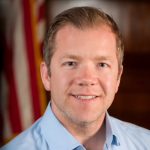Faced with a shortage of drivers, Trevor Dunlap had to find a new way to recruit interested candidates for his Chesapeake-based trucking and warehousing companies, Givens Transportation Inc. and Givens Inc.
“It’s very challenging to find qualified people and then be able to retain them,” he says, “and the wages we’re paying are substantially higher than before the pandemic.”
The solution: He plucked drivers from his current workforce. Dunlap created an in-house warehouse-to-truck driver program, which included paying for the candidates’ commercial driver’s license training, pairing them up with an experienced driver and getting them on the road.
So far, it’s worked. Givens has cut its 15% vacancy in half. Dunlap also raised entry-level wages by about 20% from pre-pandemic wages and even higher for mechanic positions, which are especially difficult to fill.
Like leaders of many other workplaces across Virginia and the nation, Dunlap, president of both companies, is trying to solve the puzzle of recruiting employees to fill gaps in his workforce while retaining the ones he has.
Labor shortages and higher labor costs are both on the minds of accountants who responded to the Virginia Society of Certified Public Accountants’ latest annual survey of current economic conditions and expectations, conducted in partnership with Virginia Business.
The COVID-19 health crisis has, if not completely subsided, at least eased considerably, but the pandemic’s impact is still causing economic ripples, including the nation’s widespread labor shortage.
Bob McNab, chair of the economics department at Old Dominion University‘s Strome College of Business and director of the Dragas Center for Economic Analysis and Policy, says looking ahead to 2023, several of the challenges from the pandemic era will continue. Chief among them: labor shortages, inflation and the possibility of recession.
About 79% of VSCPA survey respondents said labor shortages are having a significant or moderate impact on their businesses. Eighty percent of survey respondents expect labor shortages to continue into 2023, and 83% of survey respondents identified labor costs having a significant or moderate impact on their companies in 2022.
The statewide survey, completed by CPAs in private industry and public sectors, including government and education, confirms that Virginia businesspeople are facing many of the same concerns as their counterparts across the country.
About 60% of survey respondents had a pessimistic view of the U.S. economy, though just 36% had a pessimistic view of Virginia’s economy.
“I kind of thought it would be starting to trend a little more optimistically,” says VSCPA President and CEO Stephanie Peters. “It’s a time where it’s hard to predict what might happen. We are in this time of uncertainty, unable to predict whether all of these global events are going to play out.”
Smaller labor pool
Multiple industries — including hospitality, health care, accounting and construction — are facing dire labor shortages that started during the pandemic and have continued beyond it.
“Virginia has not recovered all the people in the workforce that were there prior to the pandemic,” McNab says.
In January 2020, there were approximately 4.48 million people in the civilian labor force in Virginia, and in August 2022, there were 4.35 million, according to McNab.
“We have fewer people in the labor force, and those who are in the labor force are essentially employed at the same rate they were prior to the pandemic,” he says. “You have jobs almost completely recovered and a smaller pool of labor or labor force out there looking for work or working, and that means there’s not a lot of people out there who are actually unemployed.”
For the accounting industry, the labor shortage is not a new issue. Wallig says the industry needs to do a better job of advertising the potential in the profession and educating earlier, such as at the high school level.
It’s been such an issue that VSCPA formed a special task force to offer best practices and advice to its 13,000 members, as well as a white paper. Greg Wallig, managing principal for accounting giant Grant Thornton LLP’s Arlington office, is on the task force and sees the problem in his own office.
The industry has a pipeline problem, which is even more critical because the demand for accounting services is only rising. One area that’s harder to hire for is auditing, Wallig says.
“There has been an assumption over the years that ‘in the future, accounting will become automated,’” Wallig says. “Certainly, automation and use of systems has increasingly become part of the profession, but the needs have also grown in complexity. Consider trends like global supply chain, outsourcing, tax law changes, environmental reporting and the like. Accounting skill sets, which include accuracy and integrity in how data is reported, are in higher demand than ever, and the job is becoming more and more complex.”
It’s a matter of increasing demand and not enough supply.
“Finding individuals with those qualifications in sufficient numbers is difficult,” he says. “Having people who know how to audit those systems — [there are] not enough people who know how to do that. If you can’t find people for a necessary job, one way is to pay more [and] those costs get translated to higher fees for clients.”
It’s a dilemma many businesses face: Higher costs have to be covered somehow. Often, they mean higher costs for customers, which amplifies the effect of inflation.
Earlier in the year, inflation hit a 40-year high, and although the Federal Reserve Bank has raised interest rates to battle the rise, prices have continued to spike through the early fall.
Grant Thornton is making a significant effort to retain its employees, including additional midyear raises for the past two years to keep up with demands in the marketplace.
At McKinney & Co., an architectural and engineering firm in Ashland, Treasurer Melanie Randall sings a similar tune. It’s been hard to find enough engineers and architects to fill openings, an issue that started before the pandemic but has worsened.
With just 17 employees, McKinney is small, and the impact of five unfilled positions hits hard. As a result, projects take longer to complete. Pay rates may have been the issue a few years ago, Randall says, but now candidates want more work-life balance, or to work remotely, which is harder to accommodate due to the nature of their projects.
“The idea that we’re going to return to where we were in January/February 2020 is somewhat misguided,” McNab says. “People’s expectations of work/life balance are dramatically different.”
To chip away at the problem, McKinney is incentivizing its employees to recommend new hires, using employment and recruiting agencies, and cross-training current workers in disciplines other than their own. For example, a structural engineer may be able to help the electrical engineering department, and Randall’s company has discussed acquiring a smaller firm that already has the workers McKinney needs.
Smaller companies aren’t the only ones suffering. Newport News Shipbuilding, the state’s largest industrial employer with about 25,000 workers, has been trying to fill 5,000 slots to keep up with a backlog of $31.8 million in projects.
Newport News Shipbuilding, a division of Huntington Ingalls Industries Inc., the nation’s largest military shipbuilder, has expanded its outreach nationally, says Xavier Beale, vice president of human resources and trades at NNS. Because the shipyard needs people with particular skills, it is working with regional workforce councils and vocational and technical schools.
Another pipeline for workers the company recently identified is in Puerto Rico. The first cohort of 20 workers is being brought in from the unincorporated U.S. territory and are being provided with baseline training and connected with an employee resource group to help them adapt to the Hampton Roads area.
Location matters, even if that’s a little less relevant when it comes to remote workers, says Jermaine Johnson, PNC Financial Services Group Inc.’s regional president for the Greater Washington, D.C., and Virginia area. He notes the different dynamics of hiring remotely. In some cases, it’s more advantageous, allowing employers to recruit from virtually anywhere. But it can also be difficult, because there’s more competition for remote workers.
Some employers in Virginia are finding more creative solutions to recruiting and retaining workers.
Kayla Kody, vice president of Richmond Ford car dealership, pushed for a four-day work week to give the dealership group’s employees a chance to recharge before coming back to work.
“We did it because all of these roles and jobs of today in general take a lot out of you — constant incoming emails, phone calls,” she says. “I just felt like it was something that might be a good fit for our employees, so they could take a true rest in between all the things that they do.”
Kody also suspected a shortened work week would also lead to increased productivity. After analyzing the data, her hunch proved correct. She says they look at metrics such as closing rates, customer satisfaction, inquiries, appointments, etc. and she has seen increases across the board. Now, having tested out the four-day week model with her six-person guest experience team since January, she’s expanding it to 20 people in sales and possibly to other teams, as well as promoting the four-day week on LinkedIn job announcements.
Even so, Kody and other employers still face a tough labor market that favors workers.
“It’s still an employee’s market, from a point of view that there are a lot of job opportunities out there for employees,” says Chris Chmura, CEO and chief economist of Richmond-based Chmura Economics and Analytics. “They are looking at all their options: Stay where I am or move on?”
Supply chain clogs
Labor isn’t the only economic challenge facing businesses. About 54% of respondents to VSCPA’s economic outlook survey reported that supply chain disruptions are having a moderate or significant impact on their companies.
For Justin Greene, chief financial officer of Liberty Live Church, which has campuses all over Hampton Roads, it means waiting up to a year to receive orders of production equipment such as cameras, lighting equipment, video switchers and similar gear that once was available off the shelf.
The church also has plans to build a 25,000-square-foot campus in Smithfield, but costs on that 18-month project have gone up by 20% to 25%. That leaves him with a couple of options, either delaying construction to see if costs come down, or stretching it to two years to spread out the costs.
At Givens Transportation, supply shortages mean that Dunlap isn’t able to buy more trucks to grow his fleet or replace old vehicles, which in turn leads to higher maintenance costs.
“You have significantly more money in the system chasing relatively scarce goods,” says McNab, who conducts an annual analysis of Hampton Roads’ economy. “As a result, when you combine increasing scarcity with increasing demand, you get higher inflation.”
And that is leading to what could be an even bigger challenge for Virginia businesses: recession. In the VSCPA survey, 59% of respondents said they think the U.S. is heading toward a recession in 2023. That’s bolstered by the opinions of many other economists and business experts. In October, a survey conducted by KPMG reported that 91% of CEOs from the nation’s largest companies believe there will be a recession next year.
The nation entered recession in 2020 during the initial months of COVID-19, McNab says, although federal stimulus funding helped the economy recover quickly. “That injection in 2020 [and] 2021, more than likely staved off a significant recession, if not outright depression,” he says.
Marc Andersen, a senior partner with Ernst & Young in Great Falls, notes that Virginia’s experience mirrors what’s happening everywhere. But Virginia has an advantage, in part because it has a “very business-friendly environment,” he says.
“I know there is an intent by the governor and folks in Virginia to remain highly business-friendly,” he says. “As long as that climate continues, we will continue to see growth.”
Read the 2023 VSCPA survey results and member interviews.





